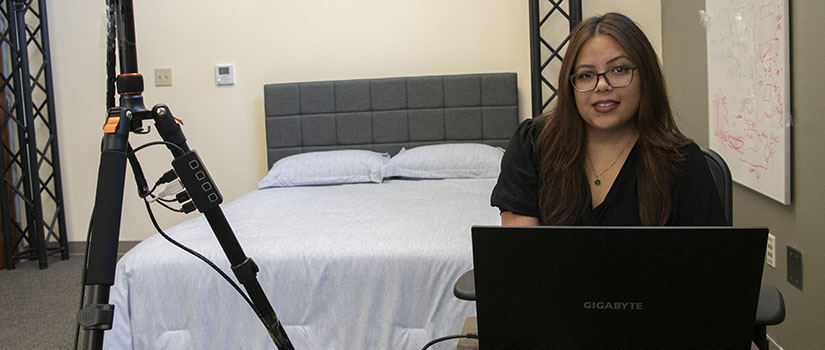Imagine a device that monitors your sleep each night. An Alexa-sized wireless device placed on your nightstand could monitor your vital signs, heart rate, breathing and even the body’s sleep position. Such advanced sensing could even be possible through home devices like wireless routers.
Computer science doctoral candidate Aakriti Adhikari is making this technology a reality through her dissertation. With next generation wireless networks looking to merge high-speed data connectivity with sensing, Adhikari’s work focuses on reconfiguring existing 5G and beyond at-home networking devices with sensing capabilities to enable healthcare applications.
Adhikari is pushing her research boundaries by using this technology for stroke patients who may experience a “wake-up stroke,” which occurs during sleep and goes unnoticed until the patient wakes up. The overnight record of vital signs could help doctors pinpoint the time for the stroke, which is crucial for treatment and can improve patient outcomes.
“What we are doing today is envisioning the future. Even the small amount of work we do has some effect, and seeing its real-life impact is rewarding,” Adhikari said.
Adhikari grew up in Nepal, where she first decided to pursue engineering and was always one of the few women in her classes. After graduating with a bachelor’s degree in electrical engineering, she moved to the U.S. to pursue her master’s degree at the University of Toledo. According to Adhikari, this was where her passion for computer science began.
“It’s been a long journey to what I’m working on now,” Adhikari says. “Before this, I was only doing experiments with volunteers at a lab. When we recruited actual patients, it was a different experience. It’s fulfilling to see that it’s really needed.”
Adhikari joined the college’s computer science and engineering Ph.D. program in 2020. During the COVID-19 pandemic, she developed a spirometry test system to measure lung capacity using 5G devices, including smartphones. This was her first project using wireless signals to collect vital sign data, which is research she continues today.
Adhikari’s current project, a contactless sleep monitoring system, uses wireless signals known as millimeter waves to model the body’s position and track how patients sleep. Her work shows fine-grained applications in posture estimation, sleep monitoring, vital sign monitoring and lung functioning. Its applications to beyond stroke patients and can be used for those who struggle to wear sensors, such as the elderly or newborn babies.
Adhikari’s research won the Best Doctoral Consortium Presentation Award at this year’s Richard Tapia Conference, a yearly seminar that celebrates diversity in computer science. She has also received several grants and scholarships, including from the Institute of Electrical and Electronic Engineers International Conference on Computer Communications, Association for Computing Machinery International Conference on Mobile Systems, Applications and Services, Grace Hopper Celebration, and Committee on Widening Participation in Computing Research Grad Cohort for Women. Adhikari said these recognitions motivate her to continue with research.
Adhikari’s research is supported by her advisor, Associate Professor Sanjib Sur of the Department of Computer Science and Engineering. Sur is the lab director at SyReX, a group of computer systems researchers focusing on wireless networking, mobile computing, and machine learning. Adhikari says her work is even more impactful thanks to Sur’s and her lab mates’ contributions.
Adhikari has been studying in the U.S. since 2017, but she credits her family in Nepal with much of her success.
“Without my family’s support, I would not be here. They’re far away but very supportive and with me on this journey,” she says.
Adhikari is graduating with her Ph.D. in 2025. She is enthusiastic about continuing her research and is committed to pursuing it further. Patients are not the only ones who are helped by her research – Adhikari also benefits personally and professionally.
“You learn new things each day, and there’s so much to do in the healthcare field,” Adhikari said. “I want to keep doing this and improving. We are all contributing something, so we have to love what we do.”
